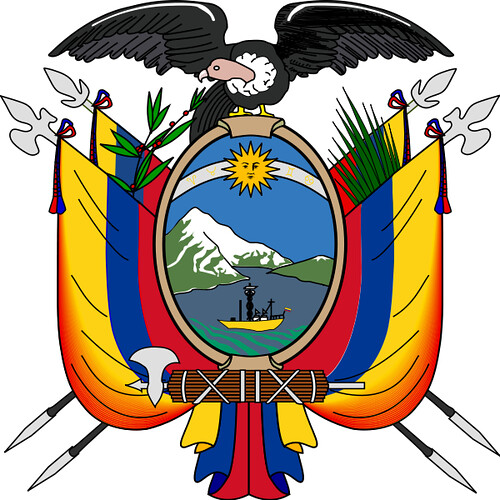
Coat of Arms of Ecuador
Can you imagine Land-Air-Water (LAW) with human-supported rights?
A New Law of Nature: “The South American republic of Ecuador will next week consider what many countries in the world would say is unthinkable. People will be asked to vote on Sunday on a new constitution that would give Ecuador’s tropical forests, islands, rivers and air similar legal rights to those normally granted to humans. If they vote yes — and polls show that 56% are for and only 23% are against — then an already approved bill of rights for nature will be introduced, and new laws will change the legal status of nature from being simply property to being a right-bearing entity.” Clare Kendall reports for the UK Guardian September 24 2008.
Viva Ecuador! Most of us would assume that nature has a natural right to exist. Now in Ecuador, this right could finally be codified in human law. The articles listed below, were passed on July 7 of this year by the 130 member Ecuador Constitutional Assembly elected nationwide to review the constitution. They will be voted on by public referendum next week.
Proposed Ecuador Constitution to say:
Nature Has Rights
Art. 1. Nature or Pachamama, where life is reproduced and exists, has the right to exist, persist, maintain and regenerate its vital cycles, structure, functions and its processes in evolution. Every person, people, community or nationality, will be able to demand the recognitions of rights for nature before the public organisms. The application and interpretation of these rights will follow the related principles established in the Constitution.
Art. 2. Nature has the right to an integral restoration.
This integral restoration is independent of the obligation on natural and juridical persons or the State to indemnify the people and the collectives that depend on the natural systems.
In the cases of severe or permanent environmental impact, including the ones caused by the exploitation on non-renewable natural resources, the State will establish the most efficient mechanisms for the restoration, and will adopt the adequate measures to eliminate or mitigate the harmful environmental consequences.
Art. 3. The State will motivate natural and juridical persons as well as collectives to protect nature; it will promote respect towards all the elements that form an ecosystem.
Art. 4. The State will apply precaution and restriction measures in all the activities that can lead to the extinction of species, the destruction of the ecosystems or the permanent alteration of the natural cycles.
The introduction of organisms and organic and inorganic material that can alter in a definitive way the national genetic patrimony is prohibited.
Art. 5. The persons, people, communities and nationalities will have the right to benefit from the environment and form natural wealth that will allow well-being.
The environmental services cannot be appropriated; its production, provision, use and exploitation, will be regulated by the State.
‘Public organisms’ in Article 1 means the courts and government agencies, i.e., the people of Ecuador would be able to take action to enforce nature rights if the government did not do so.’
One can hope that Ecuador is leading the way toward a new people-and-nature approach for our planet. This could be the kernel or meme for the true 21st Century planetary paradigm shift in awareness and practice leading toward survival and sustainability for all.
No comments:
Post a Comment